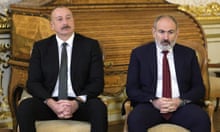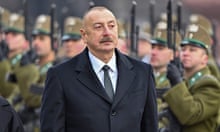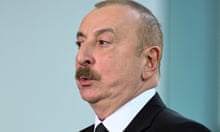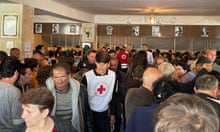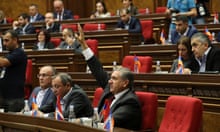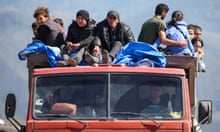Dozens of soldiers have been killed in the second day of clashes between Azerbaijani and Armenian forces over a disputed south Caucasus region, with international calls mounting for an immediate ceasefire.
Civilians have also been killed and are said to be among the hundreds wounded in the fiercest clashes since 2016 in an area that provides crucial transit routes for gas and oil to the international market.
Tensions between the countries have been growing for months over the Nagorno-Karabakh region, an enclave legally considered to be part of Azerbaijan but which has been run by ethnic Armenians since it declared independence in 1991.
Fighting was reported overnight on Sunday and throughout Monday, with both sides accusing each other of using heavy artillery, targeting civilians and deploying foreign mercenaries.
The authority that runs Nagorno-Karabakh said 28 more of its troops had been killed in fighting with Azerbaijani forces, bringing its total number of casualties to 59. The territory’s defence ministry has also reported two civilian deaths, a woman and her grandson.
About 200 people have been wounded in the fighting, the Armenian defence ministry said on Monday, while Azerbaijani authorities said 26 civilians have been wounded on their side.
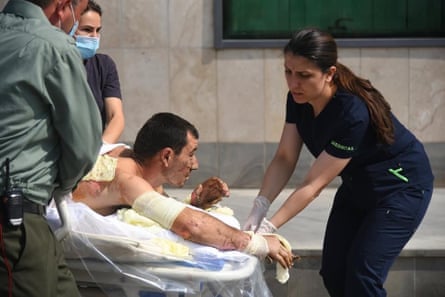
Armenia said about 30 of its soldiers had been killed and that it had retaken some of the positions it lost on Sunday.
Analysts have said the conflict at the crossroads of Europe and Asia risks drawing in larger regional powers including Russia, Iran and Turkey. The latter has strongly sided with its Azerbaijani allies and called on Monday for Armenia’s “occupation” of the disputed region to be ended.
“Once Armenia immediately leaves the territory it is occupying, the region will return to peace and harmony,” the Turkish president, Recep Tayyip Erdoğan, said.
The two countries have strong historical and cultural links and cooperate on several energy projects.
Regional powers including Iran and Russia have joined China, the US, Spain and others in an international chorus condemning the violence and calling for the immediate resumption of peace talks to resolve the century-old conflict over the area.
“We hope and we urge everyone to do everything they can in order to prevent an all-out war from breaking out, because this is the last thing the region needs,” the European commission spokesman Peter Stano told reporters in Brussels. “There is no military solution to this conflict.”
The Kremlin spokesman, Dmitry Peskov, said on Monday that the situation in Nagorno-Karabakh “is a cause for concern for Moscow and other countries”.
“We believe that the hostilities should be immediately ended,” he told reporters, adding that the process of resolving the conflict between the two countries should shift into “a politico-diplomatic” dimension.
Both sides have sought to cast each other as the aggressor in this week’s clashes, with Armenia’s parliament on Monday condemning what it called a “full-scale military attack” by Azerbaijan on the disputed area.
Armenian officials have accused Turkey of providing intelligence and military assistance to Azerbaijan as well as of funnelling about 4,000 Syrian militia forces into the region – a claim Baku described as “absolute nonsense”.
“Turkish military experts are fighting side by side with Azerbaijan, who are using Turkish weapons, including UAVs [unmanned aerial vehicles] and warplanes,” the Armenian foreign ministry said, casting its fight as one against “a Turkish-Azerbaijani alliance”.
Azerbaijan claims its operations since Sunday have been a response to Armenian shelling and intended to protect civilian communities.
Ömer Çelik, a spokesman for Erdoğan’s ruling party, denied reports that Turkey had sent arms or foreign fighters to Azerbaijan. “Armenia is disturbed by Turkey’s solidarity with Azerbaijan and is producing lies against Turkey,” he tweeted.
Pipelines shipping Caspian oil and natural gas from Azerbaijan to the world pass close to Nagorno-Karabakh. Europe draws about 5% of its oil and gas from region.
Armenia and Azerbaijan fought a six-year war over the region until a ceasefire in 1994, and since then Nagorno-Karabakh has governed itself as the de facto independent Republic of Artsakh. Tens of thousands of people were killed in the war and about 1 million people were displaced.
Both countries continued to accuse each other of violating the ceasefire in the enclave and elsewhere along their border in the years since, including throughout 2020. At least 200 people were killed in a revival of the conflict in April 2016.
Reuters contributed to this report
